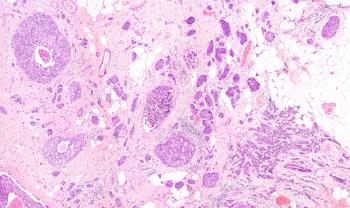
Oncology NEWS International
- Oncology NEWS International Vol 16 No 12
- Volume 16
- Issue 12
Case of patient left in PET/CT scanner reveals lessons in care
An Arizona woman will always remember the incident that was nearly as frightening as learning that she had cancer. The incident was being left inside a PET/CT scanner after the imaging center was locked up and staff had gone for the day.
An Arizona woman will always remember the incident that was nearly as frightening as learning that she had cancer. The incident was being left inside a PET/CT scanner after the imaging center was locked up and staff had gone for the day. Elvira Tellez, a 67-year-old bone cancer patient from Tucson, was scheduled to undergo a CT exam for metastatic disease in a PET/CT scanner. On Sept. 19, she arrived at Arizona Oncology, a cancer care medical group with 23 facilities statewide that is affiliated with national healthcare network US Oncology.
A nurse and an imaging technologist prepared her for the exam and placed her inside the scanner at about 4 pm. They turned the lights down and asked her not to move. Time passed. The room darkened further when the sun set at 6:25, but, according to Ms. Tellez, no one came to remove her from the scanner tube.
In an exclusive phone interview conducted in Spanish, Ms. Tellez, who speaks little English, said that she had asked the technologist how long the scan would take. "The technologist said, 'No more than 20 minutes.' But they left me inside for 5 hours," she said.
Ms. Tellez called for help when she felt she had been in the scanner too long. With some difficulty, she crawled out of the machine to find she was locked in the clinic as well. Police arrived after a 911 call from her son. She was taken to a hospital for assessment and soon released. Language difficulties did not factor into the incident, she said. The technologist spoke Spanish, and she had good communications with her personal physicians.
Arizona Oncology published an apology on its website a week after the incident, noting that the staff member involved with the case had also personally apologized to Ms. Tellez.
The statement assured patients that an evaluation was completed within 24 hours of the event. It said that the scan was completed successfully and that Ms. Tellez had not been in danger of radiation overexposure. New procedures have been established, including a complete facility sweep and implementation of checks and balances to be completed before the clinic's daily lockdown.
Patient follow through
Such incidents offer a lesson for anyone who cares for imaging patients, said Cindi Luckett-Gilbert, advocacy chair of the SNM's Technologist Section. Nuclear medicine and radiologic technologists receive quality control and quality assurance education specific to their fields. Regardless of training or specialty, however, they should follow through with their patients from beginning to end.
"Patient care includes gathering all the history, making sure there are no medication contraindications, explaining everything, doing the scan, getting the pictures checked, and walking the patient out," Ms. Luckett-Gilbert said.
Radiologic technologists take the same view. All radiologic technology training programs teach students that patients should be walked out of the procedure room and into the dressing room, said Linda Racki, RT, a safety compliance officer at Saint Francis Medical Center's imaging department in Peoria, Illinois.
All rooms in a clinic should be checked before closing. Policies and procedures should stipulate a physical indicator showing that a room has been checked. If the technologist had been relieved by someone else, some type of hand-off communicationsas described in the 2007 Joint Commision Safety Goalsshould be made between the two staff members, Ms. Racki said.
Articles in this issue
about 18 years ago
Third-line single-agent cetuximab ups overall survivalabout 18 years ago
Modern multislice CT propels pancreas imaging forwardabout 18 years ago
Sorafenib gets ok for liver cancerabout 18 years ago
Celgene to acquire Pharmionabout 18 years ago
Novacea halts ASCENT-2 trialabout 18 years ago
RT/temozolomide raises possibility of cure in glioblastomaabout 18 years ago
Brachytherapy as effective in younger as in older menabout 18 years ago
MMA not harming patientsabout 18 years ago
Kinase inhibitor may prevent RT-induced lung injuryabout 18 years ago
FDA approves lower starting dose for dasatinib for CMLNewsletter
Stay up to date on recent advances in the multidisciplinary approach to cancer.




































